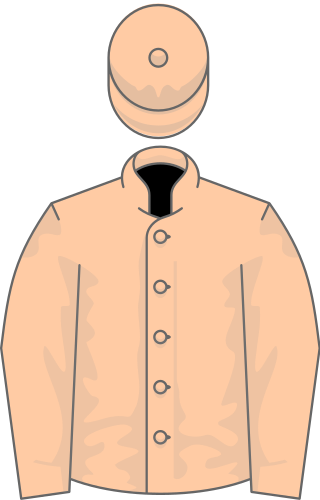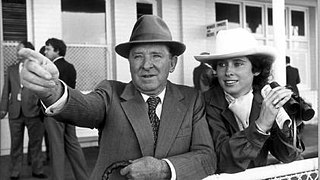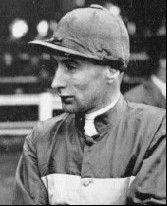
Cecil Godby (1879 - 1963) was an Australian racehorse jockey and trainer who was inducted into the Australian Racing Hall of Fame in 2016.

Cecil Godby (1879 - 1963) was an Australian racehorse jockey and trainer who was inducted into the Australian Racing Hall of Fame in 2016.
For almost half a century the name of Godby was one to conjure with in Australian racing. Cecil Godby was one of four brothers who each became successful jockeys to varying degrees, and yet they hailed from a non-racing family. Charles, Cecil, Frank and Norman Godby were born in that order and all in the space of five years from 1883 to 1887, while a sister, Dorothy, came along three years later.
As a jockey, Cecil Godby won the VRC Maribyrnong Plate on the horse Ibex in 1900. [1]
After retiring from being a jockey he became a horse trainer and achieved success in the early 1920s training the horses of Jack Corteen and George Tye notably training the successful racehorse Heroic, although he was disqualified for twelve months in 1924 which he described as an incorrect decision for the rest of his career. After his disqualification he returned to training for another twenty years. [2]
As of 1928 he had established himself at the stable Cambria House on Caulfield. [3] One of his horses won a race in 1955, earning praise of his skill as an "old master" of horse training. [4]

The Melbourne Cup is an annual Group 1 Thoroughbred horse race held in Melbourne, Australia, at the Flemington Racecourse. It is a 3200-metre race for three-year-olds and older, conducted by the Victoria Racing Club that forms part of the Melbourne Spring Racing Carnival. It is the richest two-mile handicap in the world and one of the richest turf races. The event starts at 3:00 pm on the first Tuesday of November and is known locally as "the race that stops the nation".

Thoroughbred horse racing is a spectator sport in Australia, and gambling on horse races is a very popular pastime with A$14.3 billion wagered in 2009/10 with bookmakers and the Totalisator Agency Board (TAB). The two forms of Thoroughbred horseracing in Australia are flat racing, and races over fences or hurdles in Victoria and South Australia. Thoroughbred racing is the third most attended spectator sport in Australia, behind Australian rules football and rugby league, with almost two million admissions to 360 registered racecourses throughout Australia in 2009/10. Horseracing commenced soon after European settlement, and is now well-appointed with automatic totalizators, starting gates and photo finish cameras on nearly all Australian racecourses.

Slip Anchor (1982–2011) was a British Thoroughbred racehorse best known for winning the 1985 Epsom Derby by seven lengths. After showing some promise as a two-year-old, he showed substantial improvement in the spring of 1985, winning the Derby Trial at Lingfield Park Racecourse by ten lengths before recording a rare start-to-finish win in the Derby. He was rated the best racehorse in Europe in 1985. His subsequent career was disrupted by injury, and he finished second in his other three races before being retired to stud. He had some success as a breeding stallion and died in 2011.

James Bartholomew Cummings, also known by his initials J. B. Cummings, was one of the most successful Australian racehorse trainers. He was known as the Cups King, referring to the Melbourne Cup, as he won 'the race that stops a nation' a record twelve times. During his lifetime, Cummings was considered an Australian cultural icon and an Australian National Living Treasure. His status as a racing icon in the 20th century was generally considered equivalent to that of Etienne L. de Mestre in the 19th century.
Darren Gauci is a former Australian jockey.

Archer (1856–1872) was an Australian Thoroughbred racehorse who won the first and the second Melbourne Cups in 1861 and 1862. He won both Cups easily, and is one of only five horses to win the Melbourne Cup twice or more and is one of only four horses to win successive Cups. In 2017 Archer was inducted to the Australian Racing Hall of Fame.

Thomas John Smith was a leading trainer of thoroughbred racehorses based in Sydney, New South Wales.

David Lee Freedman is an Australian thoroughbred racehorse trainer. and Hall of Fame inductee. In partnership with brothers Anthony, Michael, and Richard, he has been a prolific winner of Australia's major races in past 20 years, with four Golden Slippers, four Caulfield Cups, two Cox Plates, and five Melbourne Cups, including two of the three won by Makybe Diva. On 19 June 2007 he won the prestigious King's Stand Stakes at the United Kingdom's Royal Ascot racecourse with his champion mare, Miss Andretti.
Aaron Treve Woodcock Jr. professionally Tommy Woodcock, was the Australian racehorse trainer and handler of the thoroughbred racehorse Phar Lap.
Vo Rogue was an Australian Racing Hall of Fame Thoroughbred racehorse. He was sired by American-bred Ivor Prince whose racing career ended from injury after just two starts. Ivor Prince was a son of the British champion Sir Ivor who won the 1968 2,000 Guineas and Epsom Derby. His American damsire, Dignitas, was a multiple stakes winner in the United States and was a son of the U.S. Racing Hall of Fame inductee, Round Table. Vo Rogue was inducted into the Australian Racing Hall of Fame in 2019.
Martin Charles Pipe, is an English former racehorse trainer credited with professionalising the British racehorse training industry, and as of 2021 the most successful trainer in British jump racing.

William James Williamson was an Australian jockey who enjoyed considerable success in Australia during the 1950s and in Europe during the 1960s. He was named after his father William James Williamson, a machinist, and his wife Euphemia Agnes.

Etienne Livingston de Mestre, was a 19th-century Australian breeder and jockey of Thoroughbred racehorses. He was Australia's first outstanding racehorse trainer and racing identity. In his 30-year career, he experienced all the highs and the lows of the turf in a career which ended with him dependent on donations from racing friends.

Rogilla was a chestnut Australian thoroughbred gelding, who was a versatile racehorse performing in Australia. Known as the Coalfields Champion from Newcastle, Rogilla raced during a vintage era of the Australian turf. He won in each of the six seasons that he raced as a three-year-old to an eight-year-old. Rogilla was an outstanding galloper in Sydney and Melbourne on wet or dry tracks recording 26 wins from 4½ furlongs to 2 miles with regular jockey Darby Munro winning 16 races.

James White was a pastoralist, politician in colonial New South Wales, a member of the New South Wales Legislative Assembly and later, the New South Wales Legislative Council. White was best known as a racehorse owner, breeder and punter.
James "Old Jim" Wilson was a racehorse trainer in Victoria, Australia, founder of the historic St Albans Stud in Geelong, and trainer of the 1873 Melbourne Cup winner Don Juan and 1876 winner Briseis. His older son James Wilson, Jr. captained the Geelong Football Club and as "Young Jim Wilson" trained 1899 Cup winner Merriwee. His younger son William Wilson was the jockey who rode Don Juan to victory in the 1873 Cup.
Hugh Munro was a racehorse trainer in Victoria, closely associated with the St Albans Stud of Geelong. He was the father of noted Sydney jockeys Jimmie Munro and Darby Munro.
Dick Roden was an Australian racehorse trainer. He trained Macdougal, which was in 1959, the first horse to win the Brisbane Cup, Metropolitan Handicap and Melbourne Cup in the same year. Roden became in 1959 Australia's youngest ever trainer of a Melbourne Cup winner until 58 years later. He is an inductee to the 2005 Queensland Racing Hall of Fame.

James Hugh Bowman is an Australian thoroughbred racing jockey. Based in Sydney, Bowman has won the New South Wales Metropolitan Jockey Premiership four times and has ridden 100 Group 1 winners. He was the jockey for Australian champion mare Winx from 2014 through to her retirement in 2019. In 2017, Bowman won the Longines World’s Best Jockey award presented by the International Federation of Horseracing Authorities. The award capped off a year in which he added to his domestic success with international Group 1 wins in Hong Kong and Japan. In 2019, he was inducted into the Australian Racing Hall of Fame, the industry’s highest accolade. Bowman is also renowned for his “She’s Apples” winning salute and his nickname of “the Undisputed Group 1 King”.
Ron Hutchinson is a retired Australian jockey, who won over 1000 races in Europe. In a 37-year racing career, he was successful across three continents.